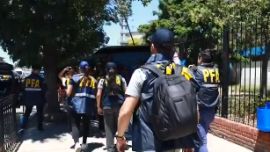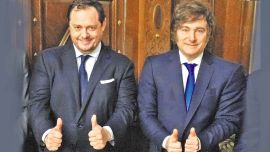The Federal Appeals Court this week quashed the trials of a number of high-profile officials from the 2003-2015 Kirchner presidencies, including ex-planning minister Julio de Vido and former transport secretary Ricardo Jaime, who were facing graft charges regarding the Sarmiento rail underpass project.
Various other businessmen from the companies who won the tender (IECSA, ComSa and Italy’s Ghella as well as Brazil’s scandal-ridden Odebrecht) were also acquitted on the grounds of lack of evidence in rulings delivered Wednesday. Among those executives was former IECSA CEO Ángelo Calcaterra, the cousin of President Mauricio Macri.
While easing the pressure on Kirchnerite figures, the same court and the same judges turned the heat on an embattled President Macri. Judges Leopoldo Bruglia and Martín Irurzun granted Federal Judge Ariel Lijo the green light to press ahead with an investigation into the debts of Correo Argentino, the post office privatised and owned by Sociedad Macri (SOCMA) between 1997 and 2003.
The appeals court decision on the Sarmiento rail underpass, voted by two of its three judges (Bruglia and Irurzun), nixed the trial ordered last April by Federal Judge Marcelo Martínez de Giorgi on the basis of at least two arguments.
Firstly, the evidence from Odebrecht corruption probes had yet to arrive from Brazil. And secondly, the judges accused Martínez de Giorgi of being much quicker to place the ex-officials involved in the alleged graft on trial than the businessmen, after having already ruled a lack of evidence in favour of the latter (also confirmed on Wednesday).
Nevertheless, Wednesday’s decision does not rule out the former officials standing trial in the future once Martínez de Giorgi has more proof, while opening the door to the continued probing the businessmen who allegedly bribed former Kirchnerite officials to clinch the Sarmiento rail underpass project, in tandem with Odebrecht.
As well as De Vido and Jaime the ex-officials favoured by the ruling also included key De Vido aide Roberto Baratta, Jaime’s successor Juan Pablo Schiavi and former public works secretary José López (already jailed and sentenced for tossing bags containing some US$9 million over a convent wall in mid-2016) among others.
The Sarmiento project has been turned into an emblematic example of how public works in Argentina were perverted into a gigantic slush fund during the Kirchnerite years. The project’s original budget of US$889 million ballooned to US$3 billion with the project barely off the ground, with only three of the 18 kilometres completed in the 13 years since originally announced. The government now expects the project to be completed by 2023.
Odebrecht executives have confessed that they paid at least US$35 million in bribes (of the US$700 million they admitted to paying across the Latin American region) to Argentine officials between 2007 and 2015 for at least three public works projects: the Sarmiento rail underpass, a Tigre water purification plant and an Escobar aqueduct.
The investigation long faced accusations of foot-dragging compared to speedy corruption trials of other Kichnerite officials, causing suspicions that courts are unwilling to take on the country’s business elite.
Correo Argentino case
In the Correo Argentino case, the Federal Appeals Court upheld Lijo’s decision to rule that there had been an “abusive haircut” of the debts left by SOCMA, the Macri family holding firm, as had been originally charged by prosecutor Gabriela Boquín.
Apart from Macri, this probe also extends to the sitting Defence Minister Oscar Aguad , who when serving as communications minister in mid-2016 quantified the Macri Group’s debt at 300 million pesos, to be paid over 15 years at an interest rate of seven percent.
Lijo, however, echoed the prosecutor’s objections in a ruling upheld by Bruglia and Irurzun last Wednesday against an appeal lodged by the Post Office’s lawyers.
Late in 2016, Boquín had rejected Aguad’s estimate, calculating the condoned debt at over four billion pesos, which would reach 70 billion pesos if allowed to run for the next 15 years.
Lijo accepted her arguments in February, 2017, nixing the Correo Argentino debt settlement as detrimental for the State.
– PERFIL / TIMES




















Comments